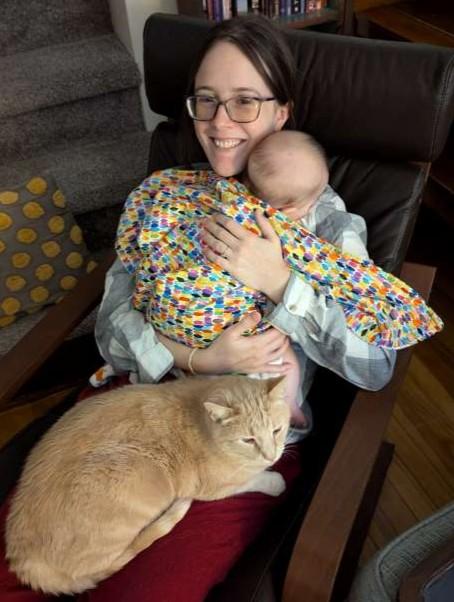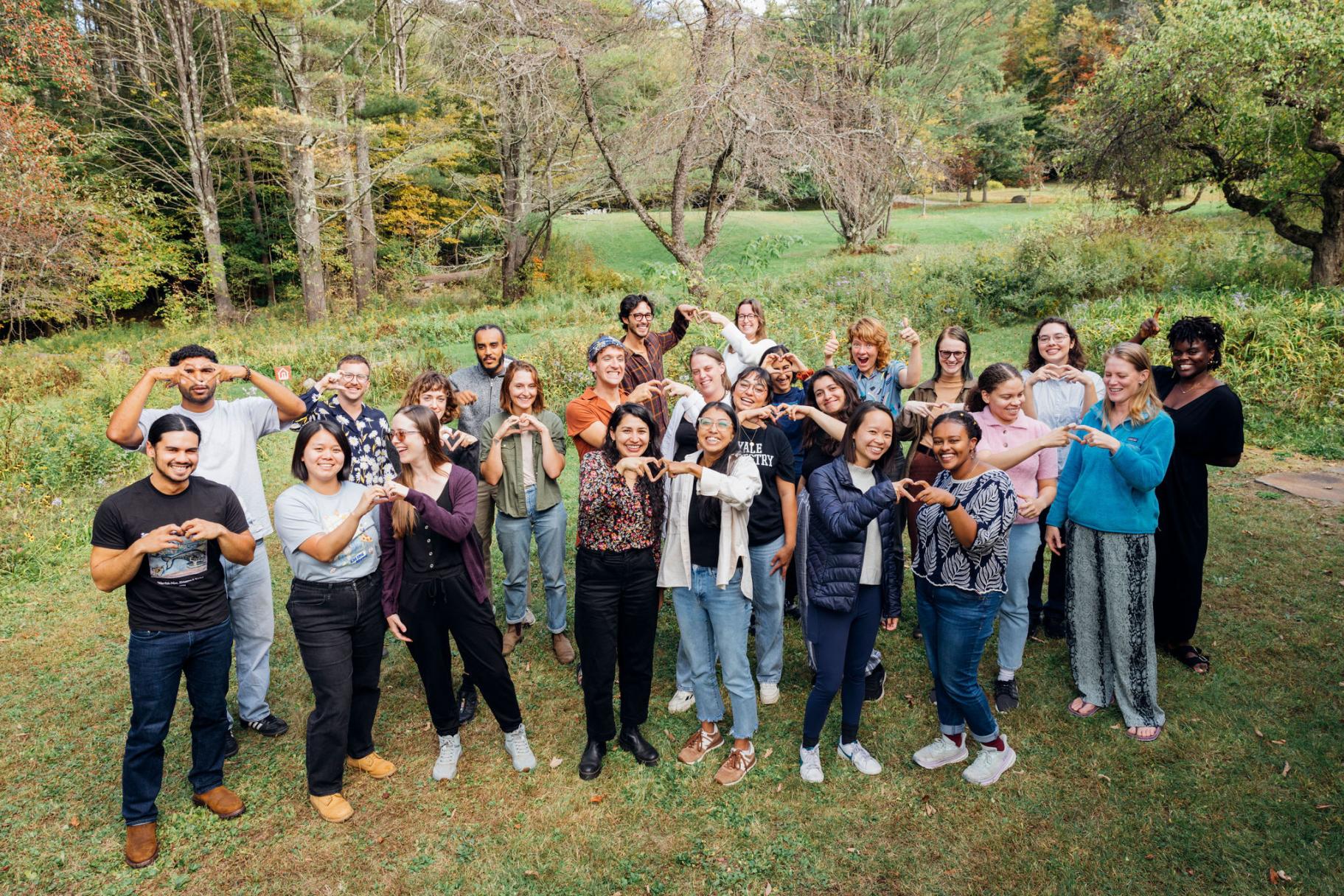Investing in each other: Switzer Foundation parental support practices
Written by Cora Preston, September 2025
At the risk of sounding like a platitude, welcoming a child into my family has truly been the most special experience, and the biggest change, of my entire life. Having a supportive employer, paid parental leave and the caregiving support during work travel has made being a working mom more manageable. In this story, we share about the Switzer Foundation’s policies in the spirit of transparency and as an example for other organizations interested in doing the same. I also reflect on my recent experience as the first staff member making use of these updated practices.
Switzer Foundation’s parental and family leave policy
It feels important to lead with the specifics of our parental and family leave policy. Employees who have worked for the foundation for at least one year, including part-time employees, may take up to 12 weeks of paid family and medical leave within any 12-month period. Family and medical leave can be applied for in the following circumstances: birth and care for a newborn child; placement of a child for adoption or foster care; to take care of a family member with a serious health condition; or for an employee’s own serious health condition making them unable to work. Employees receive their regular pay and continuation of health/retirement benefits during leave.
The foundation made the change to this policy in 2021. As multiple of our employees work part-time, myself included, the inclusion of part-time employees in the new policy was necessary to provide equitable benefits across our team. The change was also made in order to align with best practices of other peer foundations to support staff retention and recruitment. I was a recent hire when this change was made, and it was very welcome news to me as I was thinking about starting a family. I felt much more able to take that leap knowing I would receive twelve weeks paid leave, which is unfortunately not something one can take for granted in the United States.
Beyond the policy: a supportive team environment
Beyond the letter of the policy, my experience actually using it was also a positive one thanks to the supportive team environment on the staff at Switzer. The team was immediately supportive of me, and adaptive about adjusting expectations to accommodate both my pregnancy and parental leave. I truly felt that it was encouraged and expected for me to fully ‘unplug’ during my leave, and that it was ok that not everything on my usual workload would get done while I was away. While I believe that attitude in a workplace should be the norm, I know that it’s special in the urgent and hustling society we operate in today. I’m grateful to the whole Switzer staff for creating that culture of care in our team. It was extremely impactful to be able to not think about work at all during the brain fog of the newborn days, and to just focus on soaking up time with my baby, recovering, and learning the ropes as a new parent.
Caregiving support during foundation travel
The Switzer Foundation also supports staff and fellows with young children attending fellowship retreats or other foundation travel by providing accommodations for a caretaker or exploring options for childcare support if needed. The intention of this practice is to support staff or attendees whose children need to be with them full time (for chestfeeding or other reasons). The way this worked for me is that the foundation financially supported an additional person’s travel and lodging to take care of my child so I could be fully present with the programming.
My family used this support during the 2024/25 retreats. In the fall, my husband came along as a caregiver for our five-month old daughter. For the spring retreat, my mother was our caregiver. Being able to travel as a family made a huge difference in my ability to be fully present both as an employee and a parent. It alleviated so much stress about milk supply/storage, pumping, and being separated from each other during these early months, and made it possible for me to attend as my whole self. I was glad for the opportunity to get to know the incoming fellows, and it turned out to be especially important that we planned for me to attend the fall retreat, since we had a team member unexpectedly unable to travel. It was also interesting to see how the vibes of an event shift when there is a baby around, and it forced me to practice taking breaks and boundaries even while on a work trip.
When my daughter was 12 months old, I went on my first work trip without her. It was an adjustment, but not as heartbreaking as I was worried it would be! These experiences have changed my perspective on work travel, and I no longer take for granted the separation that parents undergo from their children for trips. I’m grateful to have had two trips with my daughter, so that I could fully return to work commitments without needing to be away from her overnight. Thinking outside of a staff perspective, it is important to offer support like this to fellows, especially since retreats are a requirement of the fellowship, in order to welcome fellows with small children into the network.
Investing in each other
As I reflect on how these policies, practices and the culture at the Switzer Foundation has impacted me, I’m remembering how often people have been surprised when I’ve shared about the support I’ve received as a working parent. My friends and family in the United States have been surprised in a positive way, and those in Europe have been sympathetic instead. While twelve weeks is an important improvement in the foundation’s policies and worked well for my family, it feels like a necessary minimum to offer at least this much. While many states are now requiring paid family leave, it’s disappointing that in much of the U.S. it still falls on employers to make individual decisions that have such a huge impact on families in this critical time of their lives.
I’m grateful to work somewhere that prioritizes the wellbeing of staff and fellows. Feeling like I have both moral and financial support to care for my family makes me feel invested in the foundation and like the foundation is invested in me.
I hope that more organizations will recognize the importance of practices like these to support their employees and community members. If anyone is interested in talking more about implementing policies at your organization, sharing examples of organizations with similar or more expansive benefits, nerding out about creating a parental leave plan, or learning more about anything I’ve shared here, please reach out!
Additional resources
- The Case for Offering Paid Leave: Benefits to the Employer, Employee, and Society - PMC
- Paid Leave and Employment Stability of First-Time Mothers - IWPR
- Snapshot Children and Families: State Policies on Paid Family Leave
- Foundation Operations and Management Report | Exponent Philanthropy
- Grantmaker Salary and Benefits Report | Council on Foundations
- The State of Paid Family and Medical Leave in the U.S. in 2025 - Center for American Progress
- State Paid Parental Leave Policy: A Tool to Reduce Inequality Within and Between Families
- The urgent necessity for paid parental leave
- Paid Family Leave Workshop Toolkit
- Why Doesn’t the U.S. Have a Paid Family Leave Policy?




